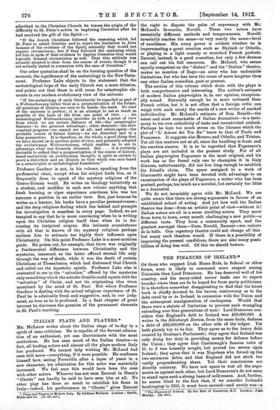ITALIAN PLAYS AND PLAYERS.* Mn. McLEon writes about the Italian
stage of to-day in a spirit of sane criticism. He is capable of the fervent admira- tion of an enthusiast, yet can discriminate with the most meticulous. He has seen much of the Italian theatre—in fact, all leading actors and almost all the plays modern Italy has produced. We cannot help wishing Mr. McLeod had seen still more—everything, if it were possible. He confesses himself how, seeing Ferravilla after a lapse of years in a new character, his admiration for this actor was materially increased. We feel sure this would have been the case with other actors. Whoever has not seen Zacconi in Ibsen's "Ghosts" can hardly be said to have seen him at all. No other play has done so much to establish his fame in Italy—indeed, his performance in " Ghosts " gives Zacconi
• Plays and Players in Modern Italy. By Addison McLeod. London : Smith, Elder and Co. C7s. 65. net.) the right to dispute the palm of supremacy with lir. McLeod's favourite, Novelli. These two actors have different methods and temperaments. Novelli invariably reaches the same—or very nearly the same—level of excellence. His every power is evident whether he is impersonating a great creation such as Shylock or Othello,. or playing in a light comedy or wretched French pochade.. Zacconi, instead, is a good comedian, but only a few dramas. can call out his full resources. Mr. McLeod, who seems equally competent on the " dialect " and the "Italian" theatre, makes no mention of Zago—an actor who has undeniable limitations, but who has been the cause of more laughter than any other Italian comedian, past or present.
The section of this volume which deals with the plays is both comprehensive and interesting. The author's estimate of modern Italian playwrights is, in our opinion, exception- ally sound. Naturally enough he is more unbiased than French critics, but it is not often that a foreign critic can weigh with such nicety the merits of a new writer of marked individuality. Mr. MeLeod's estimate of Sem Benelli—the latest and most remarkable of Italian dramatists—is a testi- mony to his own catholicity of taste and unrestricted outlook. Perhaps he lays too much stress on the likeness which the plot of "L' Amore dei Tre Re" bears to that of Paolo and Francesca. It suggests also Romeo, and Othello, and Tristan. Yet all this matters not at all, since the handling is fresh and the emotion sincere. It is to be regretted that Fogazzaro's plays are not included in the present study. For of all Italian playwrights Fogazzaro is the most original, and his work has so far found only one to champion it in Italy Giacosa, unfortunately, did not live long enough to establish his friend's claim. The space assigned to a work of Giacometti might have been devoted with advantage to an examination of the plays of Fogazzaro, a writer who has been praised, perhaps, too much as a novelist, but certainly too little as a dramatist.
We do not invariably agree with Mr. McLeod. We are quite aware that there are strong arguments in favour of an established school of acting. And yet how well the Italian theatre has done—from an artistic point of view—without it! Italian actors are all in a sense strolling actors. They move from town to town, every month challenging a new public—a different taste. They form a community apart, and the greatest amongst them--Duse, Novelli, Zacconi—are enfants de la balle. One repertory theatre could not change all this, but many such theatres would. If there is a possibility of improving the present conditions, there are also many possi, bilities of doing less well. Of this we should beware.






































 Previous page
Previous page